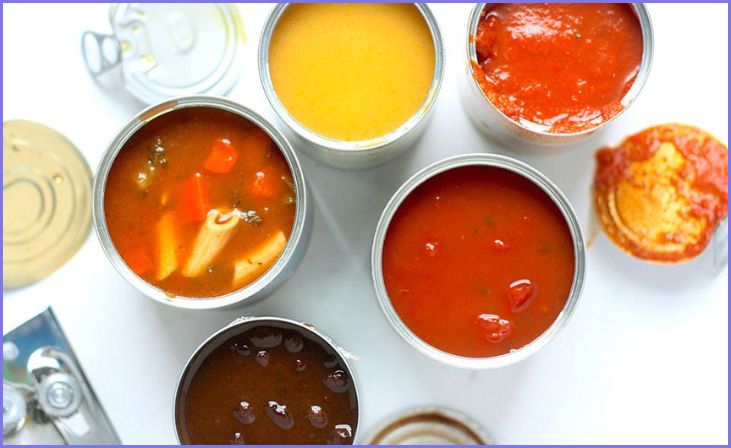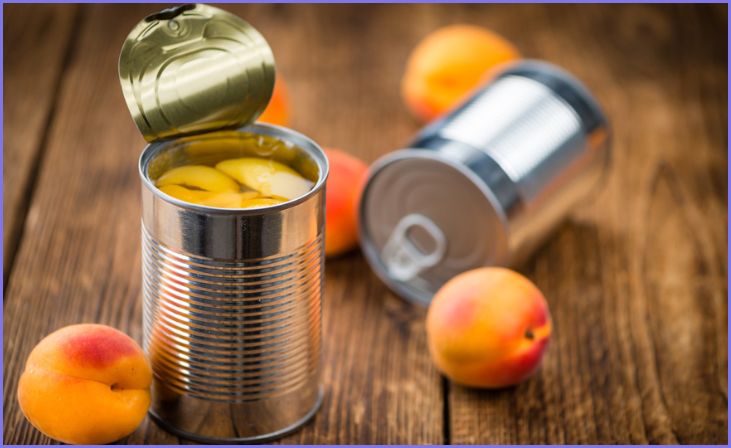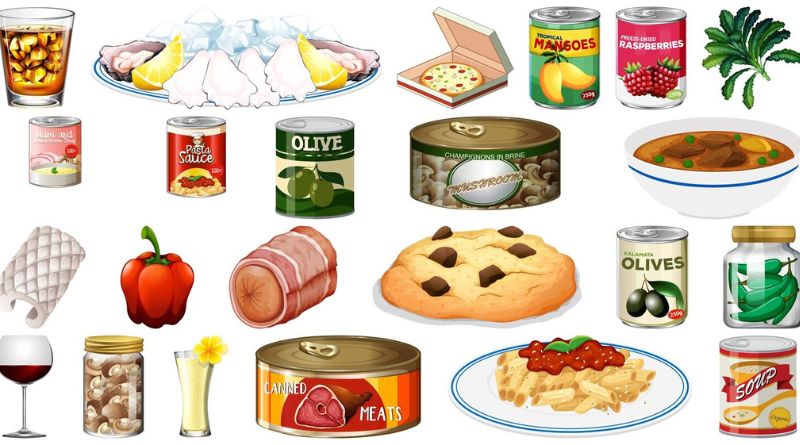Welcome to a revealing journey through the aisles of canned foods, where we uncover some of the world’s unhealthiest offerings. While convenience is a key factor in the popularity of canned goods, not all options contribute positively to our well-being. In this exploration, we’ll shed light on canned foods laden with excessive sodium, added sugars, unhealthy fats, and artificial additives.
From soups to sauces, we’ll navigate the nutritional pitfalls that may lurk behind seemingly innocuous labels. Join us as we delve into the nutritional profiles of these canned products, urging consumers to make informed choices for their health and well-being. It’s time to lift the lid on the less-than-healthy side of the canned food aisle.
World’s Unhealthiest Canned Foods
Expose the hidden health risks in canned goods! Uncover sodium, sugars, and additives—navigate the aisle wisely for a healthier pantry.
1. Canned Soups

Canned soups, although convenient, can be laden with health concerns. A typical pitfall is the elevated sodium content, a known contributor to hypertension. Excessive salt intake poses risks for heart health, making it crucial to monitor consumption. Moreover, preservatives and additives used in canned soups may compromise nutritional value.
Opting for low-sodium varieties or preparing homemade soups allows for better control over ingredients, promoting a healthier alternative. Prioritizing fresh and whole foods remains key to a balanced and nutritious diet, ensuring that convenience doesn’t compromise long-term well-being. Stay mindful of labels and explore healthier soup options to safeguard your health.
For More- 7 Breathtaking Fast-Food Restaurants That Dazzle
2. Canned Spaghetti and Meatballs
Canned spaghetti and meatballs, while convenient, often sacrifice nutritional quality. These products can be high in added sugars, sodium, and preservatives. Excessive sugar intake is associated with various health issues, and the high sodium content may contribute to elevated blood pressure. Additionally, the processing and canning methods may compromise the overall nutritional value of the meal.
Choosing whole, minimally processed alternatives or preparing homemade versions allows for better control over ingredients, ensuring a healthier and more nourishing option for your meals. Prioritizing fresh, whole foods over heavily processed canned options is a proactive step toward a more balanced and nutritious diet.
3. Canned Ravioli
Canned ravioli, a quick meal solution, may come with nutritional drawbacks. These products often contain high levels of sodium, preservatives, and refined ingredients. Excessive sodium intake is linked to health issues like hypertension, emphasizing the importance of monitoring consumption. The processing involved in canning may also diminish the overall nutritional quality of the ravioli.
Opting for fresh or frozen alternatives, or crafting homemade ravioli, allows for better ingredient control and a healthier meal choice. Prioritizing whole, nutrient-dense foods is key to maintaining a balanced and nutritious diet, mitigating potential health risks associated with heavily processed canned options.
4. Canned Luncheon Meats

Canned luncheon meats, though convenient, often pose health concerns due to their high sodium and preservative content. Excessive sodium intake is associated with increased risk of hypertension and cardiovascular issues. Additionally, the presence of preservatives like nitrites and nitrates may have potential health implications.
Regular consumption of these processed meats has been linked to adverse health effects. Choosing fresh, lean protein sources or preparing homemade alternatives provides a healthier and more wholesome option, reducing the intake of additives and promoting overall well-being. Prioritizing whole, minimally processed foods over canned luncheon meats contributes to a more balanced and nutritious diet.
5. Canned Chili
Canned chili, while convenient, often contains high levels of sodium and may include additives. Excessive sodium intake is linked to health issues like high blood pressure, emphasizing the importance of monitoring consumption. Additionally, some canned chili products may contain preservatives or artificial ingredients. Opting for homemade chili or choosing low-sodium, natural alternatives allows for better control over ingredients and a healthier meal option.
Prioritizing fresh, whole foods over heavily processed canned options is a proactive step toward a more balanced and nutritious diet, reducing the potential risks associated with the consumption of canned chili.
6. Canned Cheeses
Canned cheeses, while providing convenience, often contain added preservatives and stabilizers. These additives may impact the overall nutritional quality of the cheese and contribute to an increased intake of artificial substances. Opting for fresh, natural cheeses without the need for canning helps avoid unnecessary additives and enhances the overall nutritional profile of the product.
Choosing whole, minimally processed cheeses or exploring homemade options allows for better control over ingredients, promoting a healthier and more wholesome addition to meals. Prioritizing natural, unprocessed sources of cheese aligns with a balanced and nutritious diet, minimizing potential health risks associated with the consumption of canned varieties.
7. Canned Fruit in Syrup

Canned fruit in syrup may seem convenient, but it often contains added sugars and syrups, contributing to higher calorie and sugar content. Consuming excessive added sugars has been linked to various health issues, including obesity and dental problems. Opting for canned fruit in natural juices or, even better, choosing fresh, whole fruits is a healthier alternative.
This allows individuals to enjoy the natural sweetness of the fruit without the unnecessary addition of sugars. By prioritizing whole, minimally processed options, one can maintain a more balanced and nutritious diet, reducing the potential risks associated with consuming canned fruit in syrup.
8. Canned Sweetened Condensed Milk
Canned sweetened condensed milk, while offering a rich and sweet flavor, is high in sugar and calories. It is commonly used in desserts and coffee but can contribute to excessive sugar intake. Regular consumption of foods high in added sugars may lead to health issues such as weight gain and increased risk of chronic diseases.
Opting for alternatives like unsweetened condensed milk or using it sparingly can help reduce sugar intake. Additionally, incorporating natural sweeteners or exploring healthier substitutes aligns with a more balanced and nutritious approach to food choices. Prioritizing mindful consumption of sweetened condensed milk contributes to overall well-being and supports healthier dietary habits.
Also Read- 28 Most Popular American Foods and Desserts
Conclusion
As we conclude our exploration of the world’s unhealthiest canned foods, it’s clear that convenience doesn’t always align with nutritional value. From sodium-packed soups to sugar-laden fruits, the canned food aisle harbors choices that may compromise our health. Armed with knowledge about additives, preservatives, and excessive levels of certain nutrients, consumers can make more informed decisions when selecting canned products. Remember, moderation and awareness are key when navigating the canned food landscape. Choose wisely to strike a balance between convenience and nutritional well-being.
FAQs
No, many canned foods can be part of a healthy diet. It’s essential to read labels and choose options with minimal additives and lower levels of sodium and sugars.
Yes, options like canned vegetables, legumes, and fruits without added sugars or excessive sodium can be nutritious choices.
Rinse canned vegetables to reduce sodium, choose products with no added sugars, and opt for items packed in water or natural juices rather than syrup.







